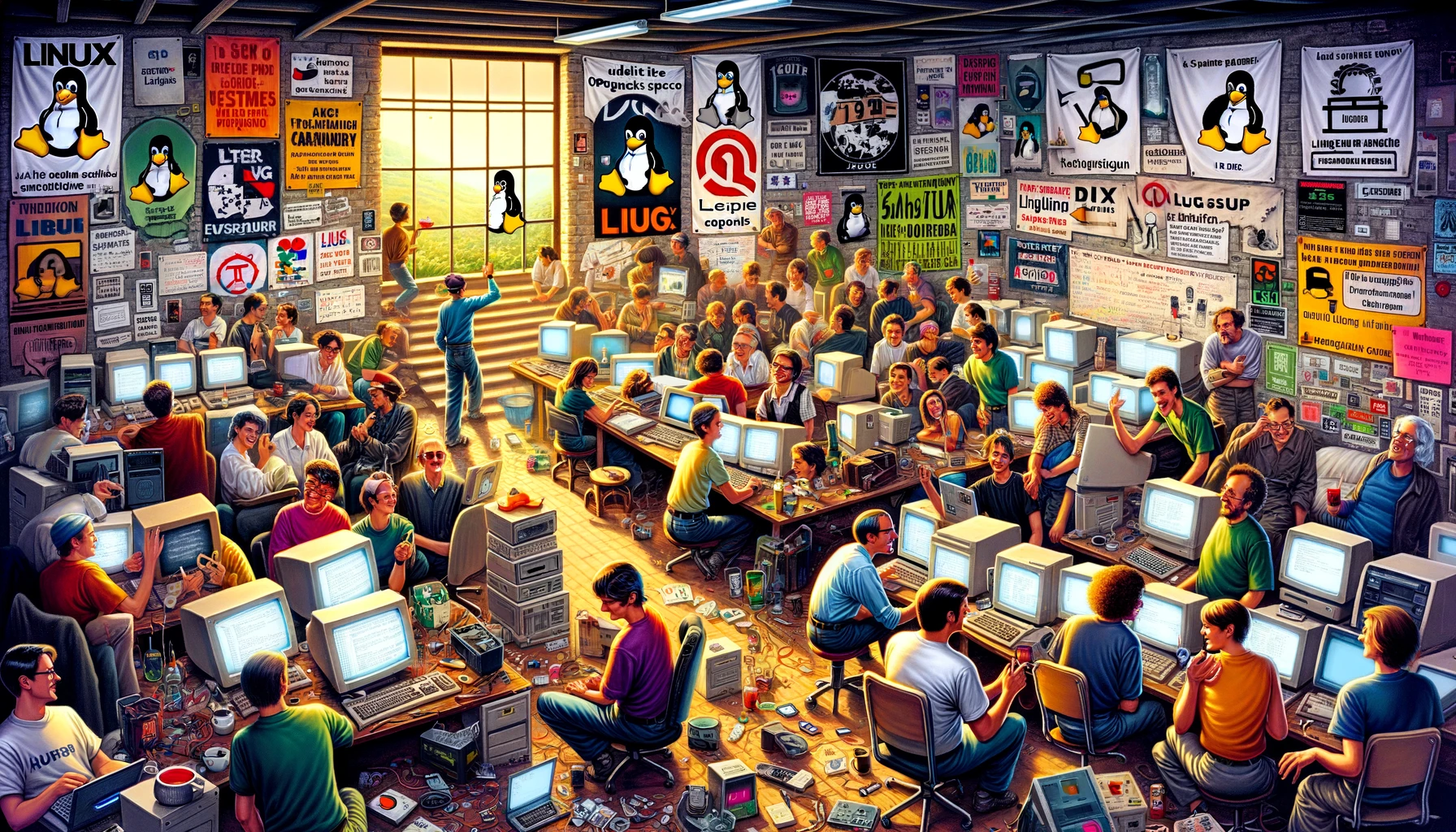Can FOSS Bring "Open" to AI?

If I try to trace my roots in Open Source, I'd probably have to go back to my early days in the mid to late 1970s and the time I spent playing with my Commodore PET, then TRS-80 Level II, as well as all those other computers that would follow. Back then, if you wanted your personal computer to do anything at all, you'd learn to program. There were magazines with pages of code shared by other enthusiasts, and if something caught your attention, you'd sit at your old (then, new) computer and carefully type in the code from the magazine. The next inevitable step involved carefully studying the code to find out where you made mistakes typing it in. The source was literally open, right there on the page.
Years later, I went to work in IT, initially doing tech support, then moved into systems administration (what you kids today call, "DevOps"). There were projects out there on the Internet to run email services, FTP servers, and other cool tools with names like Archie, or Gopher. In 1992, I first ran across something called "Linux" and the rest, as they say, is history. Okay, maybe not so simple. For me, though, and apparently a whole lot of other people, there was something really interesting happening around Linux that didn't happen before. Suddenly, a globe-spanning community of people got the same bug, infected with that same feeling that something was different now.
We could change the world.
The early days of the Linux and open source movement were fueled by a sense of idealism and the belief that technology could level the playing field, giving everyone access to powerful tools and the ability to shape their own digital destinies. We gathered in Linux User Groups (LUGs), shared ideas, code, and helped build the World Wide Web of today. We ran Installfests, where volunteers would show people how they could replace their Windows systems by installing Linux, and share in the power to build a new digital, and open, world. We built organizations to foster and protect the spirit of free and open source software, aka FOSS. There were some who thought bigger still. Could we use this free software to put technology in the hands of people who could not otherwise access it? Projects like the One Laptop Per Child (OLPC) initiative, while not entirely successful, embodied this spirit of using open source to empower and uplift communities.

We were so into this whole open thing, some people (and companies like SUSE) even made music videos about Linux and Open Source Software.
It was heady stuff. I wrote a gazillion and a half articles for magazines like Linux Journal (François, please show our guests to their table,) SysAdmin Magazine, Ubuntu User Magazine, and several others. I wrote books on the subject; six of them, to be exact, including "Moving to Linux: Kiss the Blue Screen of Death Goodbye!" I went on radio and television, gave talks and lectures on the subject. I'm what you might have called a "true believer" in open source. I still am, though my feelings may be a bit more nuanced these days.
Anyhow, fast forward to today, and Linux has become ubiquitous, powering everything from smartphones, to servers, to smart TVs, to thermostats, to that light bulb in your lamp, the one that changes colour with an app on your phone. Magenta with a touch of ochre? No problem. Linux and open source became big business and some of the largest companies the world has ever known were eventually built on its foundation, with names like Amazon, Google, Facebook, and others. When you think about those behemoths, take a moment to consider that we, in the open source community, we all helped build them, even if we didn't directly profit from it, as some of those companies (along with a few billionaires) did.
A few here and there tried to tell people that they should continue to adopt and work for the principles or the open source movement, principles that built our connected world. We should, in a sense, work to take back what belonged to all of us. But, as Upton Sinclair put it, "It is difficult to get a man to understand something when his salary depends upon his not understanding it." Over time, the idealism that once drove the movement faded, replaced by a more pragmatic focus on building careers and generating wealth.
Many, even those who were driven by the spirit of FOSS, barely noticed. It was all about money now. Lots of people work in open source these days, more than in those heady "we can change the world" days. More and more people wanted to learn, and even get certified in FOSS, but it wasn't for idealistic reasons. It was for money. Don't get me wrong. I have nothing against money. I love money. I'd love to have a lot more of it. But I miss those early days where FOSS had a conscience.
I digress... In today's IT, you can safely argue that most people work in open source. But most don't know about it, and most don't care. The great machine of capitalism continues its inexorable march to profit.
And now, we have AI, possibly the most transformative technology the world has ever known. The poster child for this new technology is a company called "OpenAI" whose product, ChatGPT is not, in fact, open.

For someone who dedicated a good chunk of their working life to Open Source, this is perhaps a little ironic. While we're talking irony, consider that Elon Musk sued OpenAI for abandoning its principles, including the responsible and open development of AI for the greater good, to focus on commercial and financial gains. Pot, meet kettle.
To be fair, however, Elon Musk's Grok, the X AI model, is in fact released as open source, kind of, including the model weights and network architecture, all under the Apache 2.0 license. However, it does not include the training data or code necessary to train the model. Meta's Llama models, including Llama 3, are also famously open source, sort of, though less so than Grok. It only includes the model weights, and you can reproduce, distribute, and create derivative works, but that comes with a lot of conditions on how you intend to use it, and you have to fill out a form to get access. Also, if you have a lot of users, you need to pay for a commercial license.
There are, however, a few truly open source AI projects in the classical free and open-source software (FOSS) sense. Mistral AI is one of the notable examples, whose Mistral 7B and Mixtral 8x22B, are released under the Apache 2.0 license, which is a permissive open-source license that allows for free use, modification, and distribution, even for commercial purposes. I mentioned that Grok uses the Apache 2.0 license, but unlike Grok, Mistral includes all source code including that which is necessary to build and train the model.
Similarly, Databricks, another AI company, has also contributed to the open-source community with its models. Dolly 2.0 is an open large language model distributed under an open license, which permits the community to freely use and modify it. Like Mistral, all of the source code, including what is necessary to build and train, is also available. For people like me, the true believers, these are stand-out companies because of their commitment to openness and accessibility.
This brings me back to that whole "we can change the world" thing. The FOSS and Linux communities are in a bit of a funk of late. Attendance and interest in LUGs, for example, keeps creeping ever downward. That's sad because it represents a kind of slow death when it comes to the marriage of technology, openness, altruism, and benevolence. Hmm... that marriage seems to have four partners, and I was going to add words like conscience and philanthropy in there. :-)
So, how can we reignite that spark of experimentation and world-changing ambition? The more I get into this stuff, the more I believe that open source AI presents an interesting opportunity. It's time to forget about replacing desktops as a Raison d'être because, frankly, that ship has sailed. AI is where it's at, baby! Just as Linux democratized access to operating systems and software development, open source AI has the potential to put cutting-edge machine learning and artificial intelligence tools into the hands of a much wider range of people, including ordinary people, developers, small businesses, innovators, educators, and more. Even though the biggest and most powerful models today are in the hands of companies like OpenAI and Anthropic, these open source models like Mistral and Databricks (and Grok and Meta, to a degree) provide real opportunities for those interested in, and still possessed by, the spirit of open source.
We tend to focus on Large Language Models (LLMs) but there are a ton of other projects out there that cover voice, vision, AI art, and more. Check out open source AI communities like HuggingFace, Stability AI, projects on GitHub, and on Discord, all provide places where you can learn about and discover new tools and, if you've got that developer drive, contribute to. I might go so far as to say that open source AI is the future. You can be a part of it, but you need to get in there and play with it. Download an app like Jan or LMStudio to load up and test out LLMs on your PC.

If you're more into visual creation, get yourself a copy of Easy Diffusion, get familiar with model repositories like Civitai, and start creating.
The rise of open source, including that idealistic philosophy, built this fantastic technological world in which we all live. We had a say in its creation and its why all of our devices (or most of them) can talk to each other without needing a specific piece of hardware or software for every person you want to email, or every Website you want to visit. Those of you who have been in this game for a while know what I'm talking about.
Similarly, we can have a say in how the future of AI is shaped. We don't have to leave it to a handful of mega-corporations. Bear with me while I dream big for a moment. Imagine a world where anyone with a passion for problem-solving and a willingness to learn could harness the power of AI to tackle issues like poverty, education, healthcare, and environmental sustainability. Think open source AI platforms that helps farmers in developing countries optimize crop yields and reduce waste. We can do all that stuff by making AI that is accessible and transparent. What we need is a new generation of open source pioneers who are driven by a desire to make a positive impact, not just a profit.
We've done it before. We can do it again.
So, to all the dreamers and idealists out there who still believe in the transformative potential of open source, it's time to put aside our obsession with controlling the desktop and turn to this brave new world of AI.
What do you think? How can we foster a culture of open source AI innovation that prioritizes social good over purely commercial interests? I'd love to hear your thoughts on the practical steps we can take to make this vision a reality.
